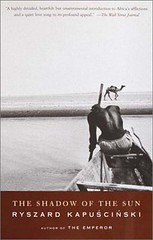Just finished reading this book last night, and I whole-heartedly recommend it to anyone who would like a well-written and thoughtful account of Africa without having to slog through pages and pages of facts. The author, Ryszard Kapuscinski, was a foreign correspondent covering African affairs for four decades, and he has witnessed many of the continent’s major historical events, from Ghana’s first days of independence (late 50’s), Idi Amin’s reign of terror, and the Rwandan genocide in 1994.
First off, it is not a “macho” book full of the brave author’s adventures on the Dark Continent. Rather, it is an introspective book that shows the author’s deep respect for the people he encounters. Kapucinski is obviously amazed by these people, their difficult lives, and the amazing strength and hope to which they cling in the face of seemingly insurmountable odds.
Also, the book is not depressing, though it does contain sadness. It would be easy to focus solely on all tragedy in Africa’s recent history, but rather than loading the book with facts and figures or gory details (though both are included at times), the author often writes more about the everyday details that surround him: the heat of the noon day sun, finding water, visiting with friends, the social importance of a shade tree, the small acts of generosity that make up the fabric of African life. In fact, though there is a wealth of historical information incorporated into the text, a good balance is struck between fact and narrative.
Often his stories are the aspects of a tale that other would choose to omit. Rather than tell us the details behind WHY he was in a certain town and WHY he had to get to another location, often he tells us only of the journey in between, starting with his departure and ending the chapter upon his arrival. This has the effect of really giving the reader insight into those daily details upon which other stories may not focus, such as descriptions of the other passengers, the potholes in the road, the smell of the air, the name of the bus driver, and so forth. To be sure, he doesn’t candy-coat anything, and there’s plenty of death and despair along with some hard scrutiny of the sad circumstances into which many of these nations have been plunged, but the book is overall a loving ode to a world of both beauty and pain, a world of extremes. I recommend it to those who love memoirs, history, or just a good, interesting read.

1 comment:
Great review, Chris. There was a neat piece in the Christmas special issue of the Economist where an Economist correspondent visits this little village in Zambia -- Lundazi -- he taught at for a couple of years 40 years ago with the Peace Corps (or rather, it's British equivalent). It's not available online -- I'll email you a copy when I get a chance.
Post a Comment